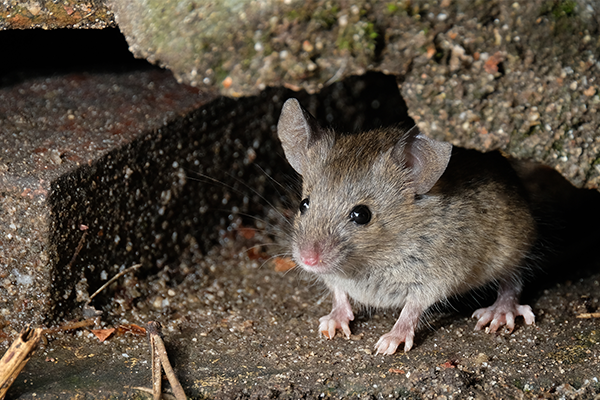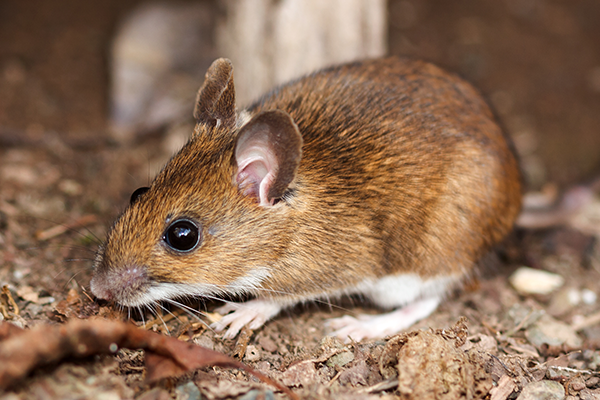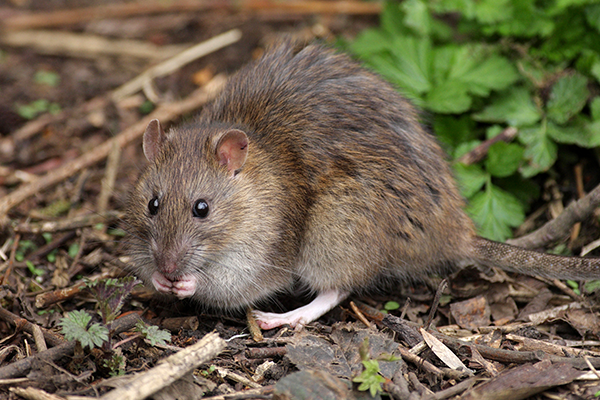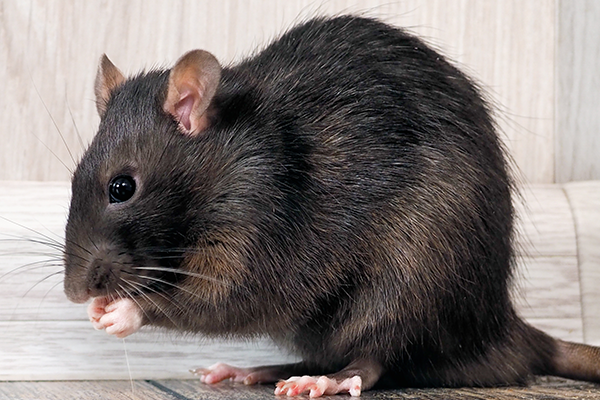What kind of rodents are most common in Virginia?
Rodents live across the world except for Antarctica and adapt very well to living in different climates and environments, both indoors and outdoors. Rodents are characterized by having a pair of continuously growing front incisors in their top and bottom jaws. Rodents constantly chew on objects to prevent these incisors from overgrowing. Rodents most commonly found invading homes and businesses in our area are house mice, deer mice, Norway rats, and roof rats.

House Mice
The common house mouse can be identified by its small, slender body, long tail, large ears, and small dark beady eyes. Their body is typically a bit shorter in length than their tail. Their long tail and ears are both covered in a layer of soft velvety fur. Their fur can vary in color from grayish-brown to dark gray or black in color; they have a lighter colored underbelly that is usually tan or whitish in color.

Deer Mice
The deer mouse has large ears covered in fur, black eyes, a slender build, and legs that allow them to run quickly. Adults are brownish-red or grayish-brown in color and have a lighter whitish-colored underbelly and feet. Their tail is bi-colored-darker on top, a lighter color on the underside, and covered with fine hair.

Norway Rats
The adult Norway rat has a long, “heavy” body. Their unkempt-looking fur is brown and peppered with black hairs; the fur on their underbelly is typically lighter in color. Norway rats have a blunt nose, protruding small black eyes, small ears, and a bi-colored tail. Therefore, Norway rats are not agile and can be found invading basements and the first floors of homes and businesses.

Roof Rats
Roof rats are dark brown or black with some gray hairs mixed in; their underbelly is typically lighter in color. The roof rat has a long, thin body with a delicate build; they are very agile and easily climb trees and gain access to homes' rooves, hence their name. Roof rats have a pointed nose, large ears, and large dark-colored eyes. Roof rats are usually smaller in size than the stouter Norway rat.
Are rodents dangerous?
Yes, rodents are dangerous when living with or near people. Rodents carry and transmit a wide variety of diseases that can make people very ill. Some of the diseases they carry include lymphocytic choriomeningitis (LCM), salmonellosis, dysentery, hantavirus, and leptospirosis. When living inside homes and businesses, rodents will create a trail of urine and feces wherever they travel, and we mean wherever, on the floor, over counters, in cabinets, in drawers, and through closets. Their urine and feces not only are chock full of diseases and bacteria but have the potential to trigger serious allergic reactions in some people. Also, rodents carry on their bodies other parasites like fleas, ticks, and mites; these parasites can spread even more potential diseases and bacteria to people.
How are rodents destructive?
Rodents are very destructive to property and belongings found in homes and businesses because they need to constantly gnaw on objects to keep their front incisors from overgrowing. Inside both homes and businesses, they can cause fires and water damage by chewing through wires, pipes, and other structural elements. In addition, they will chew through and damage floors, walls, drywall, and insulation.
Inside homes, rodents can cause damage to personal property like furniture, clothing, shoes, pictures, books, boxes, blankets, and more. Rodents are especially problematic in commercial environments because they can damage inventory, scare away customers, and cause thousands of dollars of damages to machinery and equipment. Home or business, it doesn’t matter; rodents should not be living in either.
What's the difference between mice and rats?
Some of the main differences between mice and rats include:
-
Compared to their body size, mice have larger ears and longer tails than rats.
-
Mouse droppings are shaped like a piece of rice, while rat droppings are larger and have more rounded ends.
-
Rat’s heads are blunt and “heavy” appearing, while mice have a more triangular, pointed-shaped head. In relation to their body size, the rat’s head is larger than the mouse’s head.
-
The mouse’s fur is soft appearing and usually looks well-maintained; the rat’s fur is coarse appearing and unkempt looking.
It is important to note that a young rat and a large mouse can look very similar despite some obvious differences between mice and rats. To know for sure which species of rodent has invaded your home or business, it is always best to contact a rodent control professional to identify the type of rodent that is chewing its way through your Virginia property.
What attracts rodents?
Rodents are attracted to homes and businesses that will provide them with access to the things they need to survive- food, water, and shelter. Unsecured garbage, garden areas, compost piles, fruit trees, bird feeders, outdoor eating areas, open containers of pet food, and open containers of animal feed can all easily attract rodents to your residential or commercial property.
Once on your property, open windows, unsecured vents, open delivery doors, open garage doors, gaps in the foundation, unsecured chimneys, and damaged roofs can all allow rodents to find their way into a home or commercial facility to live safely within its walls.
Rodent infestations are typically associated with the fall season because they are looking for warm shelter to overwinter in. Still, the truth is that rodents can become a problem inside any unprotected home or business any time of the year.
How do I get rid of rodents?
To eliminate rodents from your home or business, you must first identify the species of rodent invading your property so that an effective treatment plan can be created. Rodents can look very similar to the untrained eye, so seeking professional help is the best way to identify the rodent species correctly.
Contact the rodent control professionals found at All Pest Control & Solutions to get to the root of your property’s rodent infestation and take care of it quickly and completely. Our professionals will complete an inspection, accurately identify the infestation, customize a treatment plan specific to your property, and even implement exclusion measures like eliminating holes with mesh wire to keep rodents out. Contact us today at All Pest Control & Solutions to learn about our rodent control solutions for residential or commercial properties.
Does All Pest Control have any rodent prevention tips?
Preventing rodents from finding their way onto your property and into your home or business can be difficult, but there are a few things you can do both inside and outside to help deter these dangerous and damaging pests.
Indoor Rodent Prevention Tips:
-
Store food (including pet food) inside of the refrigerator or in air-tight containers.
-
Quickly clean up crumbs and spills in kitchen and pantry areas.
-
Routinely vacuum your entire home and wash dishes daily.
-
Remove garbage from your home or business every day.
-
Keep storage areas neat, clutter-free, and organized.
Outdoor Rodent Prevention Tips:
-
Ensure that outdoor trash receptacles are stored away from the outside of your home or business, and ensure that they have tight-fitting or locking lids on them.
-
Trim back trees, bushes, and shrubs away from the outside of your home or business.
-
Make sure to repair any damage to your home or business’s roof or roofline.
-
Seal cracks and crevices found in your home’s foundation and exterior walls; place door sweeps underneath all exterior doors.
-
Fix any leaky outdoor pipes, fixtures, or clogged gutters that could supply rodents with a source of water.
Helpful Rodent Articles
The Best Way To Keep Rodents Out Of Your Christiansburg Home
Residential Services

Home Pest Control
Convenient for your schedule & effective against pests, our Home Protection plans protect your home and family!
Learn More >

Bed Bug Control
Innovative bed bug treatments designed to quickly, effectively and discreetly solve homeowners' bed bug problems.
Learn More >

Termite Control
All Pest's effective termite control treatments prevent wood-destroying termites from causing damage to your home.
Learn More >

Rodent Control
Get rid of rats and mice in your home with a comprehensive rodent control solution from All Pest.
Learn More >

Moisture Control
Using moisture control can help you avoid potential issues in your home, such as mold, wood rot, and termites.
Learn More >

Mosquito Control
Rid your property of those irritating, biting mosquitoes with All Pest's seasonal mosquito control.
Learn More >

Real Estate Inspections
All Pest Control's technicians are certified to identify and report signs conducive to wood-destroying insects.
Learn More >


